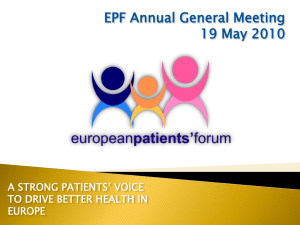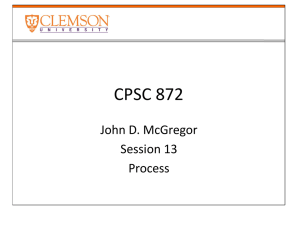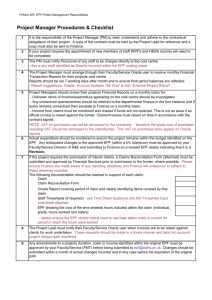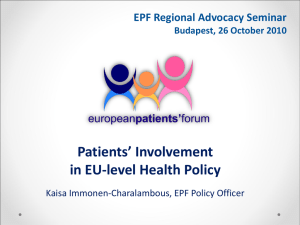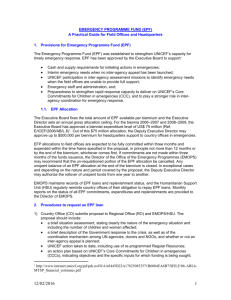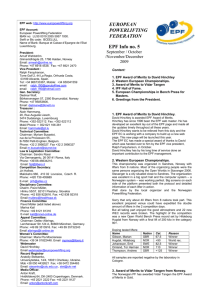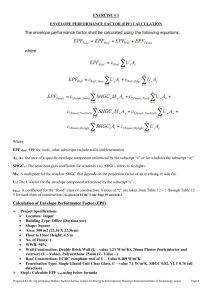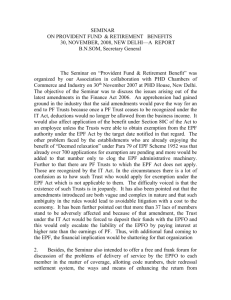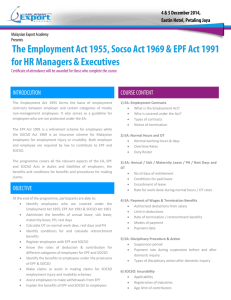History 690 Edit & Publish Journal
advertisement
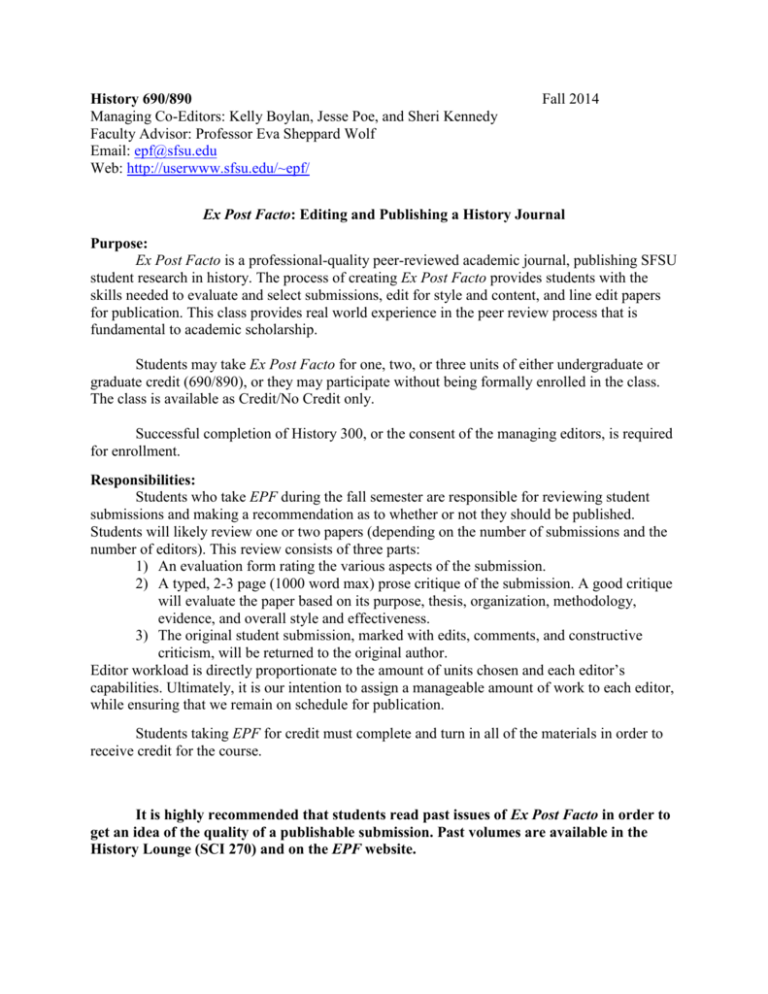
History 690/890 Managing Co-Editors: Kelly Boylan, Jesse Poe, and Sheri Kennedy Faculty Advisor: Professor Eva Sheppard Wolf Email: epf@sfsu.edu Web: http://userwww.sfsu.edu/~epf/ Fall 2014 Ex Post Facto: Editing and Publishing a History Journal Purpose: Ex Post Facto is a professional-quality peer-reviewed academic journal, publishing SFSU student research in history. The process of creating Ex Post Facto provides students with the skills needed to evaluate and select submissions, edit for style and content, and line edit papers for publication. This class provides real world experience in the peer review process that is fundamental to academic scholarship. Students may take Ex Post Facto for one, two, or three units of either undergraduate or graduate credit (690/890), or they may participate without being formally enrolled in the class. The class is available as Credit/No Credit only. Successful completion of History 300, or the consent of the managing editors, is required for enrollment. Responsibilities: Students who take EPF during the fall semester are responsible for reviewing student submissions and making a recommendation as to whether or not they should be published. Students will likely review one or two papers (depending on the number of submissions and the number of editors). This review consists of three parts: 1) An evaluation form rating the various aspects of the submission. 2) A typed, 2-3 page (1000 word max) prose critique of the submission. A good critique will evaluate the paper based on its purpose, thesis, organization, methodology, evidence, and overall style and effectiveness. 3) The original student submission, marked with edits, comments, and constructive criticism, will be returned to the original author. Editor workload is directly proportionate to the amount of units chosen and each editor’s capabilities. Ultimately, it is our intention to assign a manageable amount of work to each editor, while ensuring that we remain on schedule for publication. Students taking EPF for credit must complete and turn in all of the materials in order to receive credit for the course. It is highly recommended that students read past issues of Ex Post Facto in order to get an idea of the quality of a publishable submission. Past volumes are available in the History Lounge (SCI 270) and on the EPF website. Standards of Conduct: In an ideal world, there would be no overlap between students submitting to EPF and those on its Editorial Board. However, due to the close-knit community of scholars at SFSU, such autonomy is not feasible, and we encourage all students to submit papers to EPF. Despite this, EPF endeavors to perform to the highest academic standards of professionalism, taking as models such publications as the American Historical Review and the Journal of American History. The key to such standards lies in offering constructive and thoughtful critiques of student work, being aware that the author may be present during the editorial meetings. These critiques should be able to help all authors improve their work through the invaluable process of peer review. Email: Email is vital to our communication as a board in completing the journal. As such, after our first meeting please send an email to epf@sfsu.edu from your preferred contact email address. Give the email the subject heading “Editorial Board,” and in the body, write your name as you would wish it to appear in the journal, and whether you are a graduate or undergraduate student. Schedule N.B. All dates are subject to possible revision. If you cannot make any of the meetings, be sure to contact the editors at epf@sfsu.edu to make other arrangements. It is your responsibility to make and follow through on any alternative arrangements. Tuesday 9/2/2014, 2:30pm: Introductory meeting. Add codes will be distributed and orientation materials will be provided. (Wednesday 9/3/2014, 2:30: Repeat of above for those with scheduling conflicts) Monday 9/8/2014: Last day to add classes. Make sure you have enrolled by this time. Monday 10/6/2014: EPF fall Submissions deadline in the History Department office (SCI 276) by 3:00pm. See EPF submission form for details. Monday 10/13/2014, 2:15pm: Paper Distribution Meeting and line editing tutorial with Professor Wolf in SCI 270. Student papers will be given out to critique. Submission evaluation forms and critique guidelines will also be distributed. (Tuesday 10/14/2014, 2:30: Repeat of above for those with scheduling conflicts) Monday 11/17/2014, 2:15pm: Editorial Workshop in SCI 270. This is an optional meeting. Bring any questions or problems with your paper critiques for open discussion. (Tuesday 11/18/2014, 2:30: Repeat of above for those with scheduling conflicts) 11/24-11/30/2014 – Fall Recess. Monday 12/1/2014, 3:00pm: ALL Paper Critiques Due. Evaluation form, two copies of the critique, and the original edited submission should be delivered to the History Department Office (SCI 276). Suggested Reading / Resources : (You do not have to buy these books, but you may wish to consult them at a library. They will be especially useful during the line editing process.) Jacques Barzun, Simple & Direct: A Rhetoric for Writers, rev. ed., (Chicago: The University of Chicago Press, 1994). Richard A. Lanham, Revising Prose, 2d ed., (New York: Macmillan Publishers, 1987). William Strunk Jr. and E.B. White, The Elements of Style, 4d ed., (New York, Longman, 2000). Kate L. Turabian, A Manual for Writers of Term Papers, Theses, and Dissertations, 6d ed., (Chicago, University of Chicago Press, 2013). Library Call # LB2369 .T8 2013 on the fourth floor. The wonderful people at Purdue host a website that can answer all of your Chicago Style Guide questions: https://owl.english.purdue.edu/owl/
